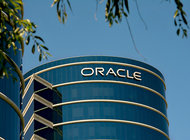 David Paul Morris/Bloomberg News
David Paul Morris/Bloomberg News
Google did not infringe on any Oracle patents when it used Java software in the Android operating system, a federal jury said on Wednesday.
The verdict, reached in Federal District Court in San Francisco, leaves Oracle with a relatively small claim of copyright infringement, making it almost certain that the judge will not demand a harsh penalty from Google.
That would be a mild end to what at one time seemed to be a major case between two of the largest companies in computer technology. Oracle, which picked up the Java software language when it bought Sun Microsystems, accused Google of violating both patent and copyright protections in developing Android, which is now the world’s most popular smartphone operating system. If Google had lost on several counts of the case, it could have been subject to severe fines or been forced to let Oracle in on future developments of Android.
“It’s a full win for us,” said Jim Prosser, a Google spokesman. “If you look at what has happened in this case so far, they didn’t have much.”
Deborah Hellinger, an Oracle spokeswoman, issued a statement saying:
“Oracle presented overwhelming evidence at trial that Google knew it would fragment and damage Java. We plan to continue to defend and uphold Java’s core write-once, run-anywhere principle and ensure it is protected for the nine million Java developers and the community that depend on Java compatibility.”
The case became notable for the star power of its witnesses, as both Oracle’s chief executive, Lawrence J. Ellison, and Google’s chief executive, Larry Page, took the stand. Evidence also included several embarrassing e-mails from Google executives discussing whether they needed to seek a software license for Java.
Earlier this month, the jury found that Google had violated Oracle’s copyright, but only on a few lines of code, out of millions of lines in Android. Other copyright claims were, like Wednesday’s patent claims, unconvincing to the jury.
Judge William Alsup of Federal District Court in San Francisco, who is presiding in the case, has shown himself to be something of an amateur programmer. He has been somewhat dismissive of the sophistication needed to create the Android code that the jury earlier found had been stolen, another indication that he was unlikely to pass harsh judgment on Google.
While Oracle may appeal the verdict, there is still another wrinkle in the trial. The judge must still rule on whether or not application programming interfaces, or A.P.I.’s, can be copyrighted. A.P.I.’s are the specifications between different software components that enable them to communicate with each other. If he rules that they cannot be copyrighted, damages will be relatively modest. If he finds that they are, the case will be again presented to a jury.
Article source: http://bits.blogs.nytimes.com/2012/05/23/google-cleared-of-java-patent-violation/?partner=rss&emc=rss